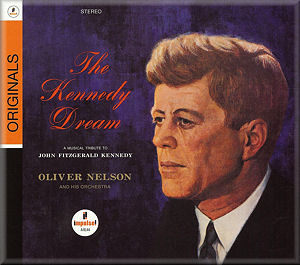- Let The Word Go Forth
- A Genuine Peace
- The Rights Of All
- Tolerance
- The Artists’ Rightful Place
- Jacqueline
- Day In Dallas
- John Kennedy Memory Waltz
Oliver Nelson and his Orchestra
Recorded 1967
This is one of Oliver Nelson’s rarer discs and it’s good to see its
revivification on Impulse! The Kennedy Dream is, in effect,
a suite of eight pieces, each prefaced by an extract from a Kennedy
speech. The music was recorded, and the record issued, four years
after Kennedy’s assassination.
Dramatic portent is established immediately via Let The Word Go
Forth with its strongly repeated figures, its Mingus-like bass,
and vivid wind choirs. But it’s Nelson’s writing, his orchestrational
gifts, that capture the ear. There’s little in the way of individual
soloing: this is, in the main, ensemble writing. Nor is it all solemn,
Oliver lightening the load with some humour. A Genuine Peace for
instance is light-hearted with a strongly defined march character
and percussion tattoos and brass calls. Funky grooves underpin Kennedy’s
speech about race in The Rights Of All and there are swinging,
bluesy textures here – Phil Woods, I assume, taking the solo; there’s
a harpsichord in there as well.
Nelson takes some of his thematic clues from Copland, as a listen
to Tolerance discloses. He tailors the music specifically to
the nature and texture of the selected Kennedy speech, so for instance
The Artists’ Rightful Place has a taut, concentrated saxophone
solo and Jacqueline sports drooping figures and nicely lyric
construction. Conversely, and as one would expect, Day In Dallas
is a dirge, though it too has some fugitive lyric moments. Finally
we have John Kennedy Memory Waltz. Here Woods is joined by
a string quartet to evoke that famous ‘Ask not what your country’
speech. Most people forget the second part; ‘My fellow citizens of
the world: ask not what America will do for you, but what together
we can do for the freedom of man’.
Despite the limited playing time this is a heartfelt and worthwhile
work. On board are Woods, Hank Jones, George Duvivier and Grady Tate,
though as noted you won’t hear much of them – except Woods – soloistically.
Nelson plays soprano and tenor saxophones from time to time. Who can
tell how long this will survive the accountant’s red line – so you’d
better get it if you’re a Nelson admirer.
Jonathan Woolf
